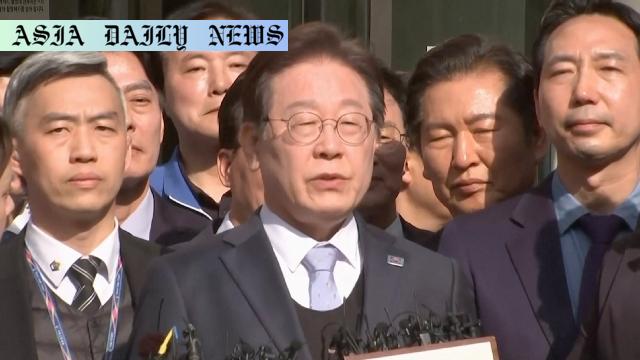South Korea’s appeals court cleared Lee Jae-myung, paving the way for potential political changes amid impeachment discussions.
South Korea’s appeals court acquitted Lee Jae-myung of election law violations.
Lee’s overturned conviction allows him to remain a frontrunner in the presidential race.
The Constitutional Court will soon decide on President Yoon Suk-yeol’s impeachment.
The case highlights the political tension between opposition and administration.

Introduction
Recent developments in South Korea’s judiciary and political realms have dramatically reshaped the country’s political landscape. A pivotal ruling by the Seoul High Court acquitted Lee Jae-myung, leader of the Democratic Party and prominent opposition figure, on charges of election law violations. These proceedings, which stemmed from Lee’s alleged false statements during his presidential campaign, had been a point of contention and speculation regarding his political future. The ripple effects of this judgment are significant, particularly as the Constitutional Court also prepares to decide on a high-profile presidential impeachment case.
The Controversy Surrounding Lee Jae-myung
Lee Jae-myung’s political career has been under scrutiny for years, with the urban redevelopment project he oversaw as a municipal mayor becoming the crux of the election law charges against him. Initially found guilty by a lower court, the verdict had issued a suspended prison sentence that would have jeopardized his eligibility to run for public office. The new judgment from the Seoul High Court overturns this previous ruling, citing insufficient evidence to support the prosecution’s fraud claims.
The accusation that Lee fabricated or misrepresented details about the project to gain favor during his presidential campaign fueled animosity between the parties involved. While the opposition hailed the acquittal as a victory for justice, Lee has alleged that the prosecution and the current administration conspired against him to weaken his political standing.
The Political Context and Implications
The acquittal of Lee Jae-myung comes at a highly volatile time for South Korean politics. President Yoon Suk-yeol, currently the subject of impeachment proceedings led by the Democratic Party, faces the possibility of being removed from office. This could set the stage for an expedited presidential election within 60 days—an event where Lee is widely considered a leading candidate. Opinion polls, buoyed by public discontent with the current administration, favor Lee as a potential successor.
If Lee had been convicted, his disqualification might have reshaped the electoral field and disrupted the opposition’s ambitions for reclaiming power. Now, his acquittal not only consolidates his standing but further polarizes the political divide between the ruling and opposition factions.
Challenges Facing South Korea’s Judiciary
South Korea’s judiciary has found itself at the center of a heated political power struggle. The decisions being made now are precedent-setting and play a direct role in shaping the country’s democratic processes. Both the initial conviction and the subsequent acquittal of Lee Jae-myung have been viewed through the lens of public opinion, with each side accusing the system of bias.
The swift appeal process underscores just how contentious and high-stakes these legal battles have become. With the prosecution expected to take Lee’s case to the Supreme Court, questions regarding judicial independence and the separation of powers in South Korea are gaining prominence once again.
The Road Ahead
As the country awaits the Constitutional Court’s decision on President Yoon’s impeachment, the tension in South Korean politics remains palpable. If the court upholds the parliamentary impeachment motion, an unprecedented political and electoral transition will begin. Lee Jae-myung’s status as a leading candidate further intensifies this momentous period, as he continues to provide a counter-narrative to the governing party’s agenda.
For now, the ruling in Lee’s favor marks a significant turning point for both his party and South Korea’s evolving political culture. The verdict also underscores the importance of a transparent and fair legal process amid accusations of political interference.
Conclusion
In South Korea, where political figures are often scrutinized and legal challenges closely intertwined with political rivalries, the recent court rulings highlight the dynamic nature of its governance. The acquittal of Lee Jae-myung not only sets the stage for potential political shifts but also raises critical questions about the intersection of law, leadership, and public trust. In the coming months, these developments will undoubtedly shape the nation’s trajectory, making the role of its judiciary ever more pivotal in safeguarding democracy.
Commentary
The Acquittal of Lee Jae-myung: A Resounding Turning Point
The recent acquittal of Lee Jae-myung, South Korea’s main opposition leader, marks a pivotal moment in the nation’s politics. This decision resonates far beyond the courtroom, presenting itself as a prominent marker of South Korea’s democratic maturity and its judiciary’s role in mediating political disputes. The ruling may appear to favor one political camp but also underscores the judiciary’s capacity to adapt and reassess in light of new evidence or insufficient grounds for earlier decisions.
Implications on South Korea’s Political Dynamics
The dismissal of charges against Lee offers grounds for reflection about the fundamentally intertwined nature of Korean politics and legal affairs. Public trust plays an essential role here. Lee’s acquittal could be seen as a sign of hope for opposition forces that feel bulldozed by the ruling government’s influence. Simultaneously, this judgment relieves potential voters who felt isolated considering who to trust if their prior candidate stayed contentious.
With impeachment proceedings against President Yoon lurking in the background, the political theater only grows more convoluted. The intersection of these events—an acquitted opposition leader and a possibly impeached president—illustrates vividly how interconnected governance and justice are in South Korea.
Judiciary’s Place Amid Power Struggles
The role of South Korea’s judiciary in recent weeks serves as a critical reminder of its balancing duty amid political partisanship. Courageous rulings such as overturning Lee’s conviction need universal respect to remind constituencies democracy is best navigated through fairness—both toward leaders like Yoon justly or through acquitting extrajudicial processes wrongly shaping influential figures unfairly.


